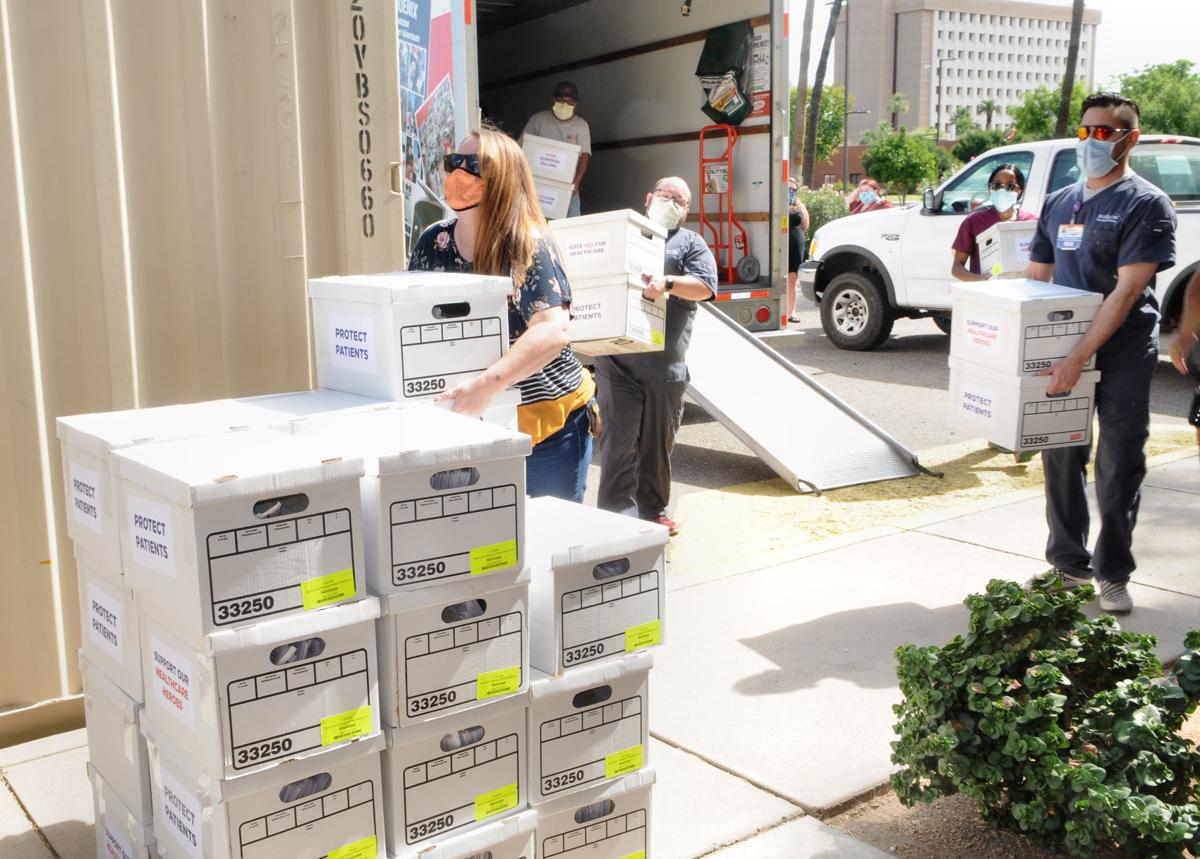PHOENIX — Arizona voters could get to decide on major changes in health-care policies and new mandates on hospitals in Arizona even as the state continues to grapple with COVID-19.
Petitions filed Thursday with the state seek to require:
- hospitals to comply with certain national standards of infection control;
- new protections for patients against “surprise” medical bills from doctors in hospitals who turn out to not be “in network”;
- a guarantee that individuals with preexisting conditions will be able to obtain insurance if the federal Affordable Care Act is repealed;
- a 20% pay hike for hospital workers — not including executives and doctors — over the next four years.
Backers say they submitted more than 425,000 signatures to put the issue on the November ballot. They need just 237,645 of those to be valid to qualify.
The campaign, financed by a California-based union, actually started last year. But spokesman Rodd McLeod said the current health crisis underlines the need for the changes.
“What COVID has done is reveal some of the cracks in our public-health system,” he said. And much of that, McLeod said, is in the form of underpaid health-care workers.
“They’re working their butts off,” he said.
“They’re dealing with a lot of stress,’ McLeod continued. “And they’re dealing with a lot of hours.”
As crafted, the initiative would require an immediate 5% pay increase, followed by successive 5% pay increases for the following three years. With the current voter-mandated minimum wage of $12 an hour for all workers, that would put the minimum for hospital workers at $14.59 when fully implemented.
McLeod said these would apply to all employees, both medical and support services, not including doctors and administrators.
Jennifer Carusetta, executive director of the Health System Alliance of AZ, which represents major chain hospitals, agreed with initiative backers on one point.
“Arizona’s health-care workers have been heroic as we continue to care for COVID-19 patients across the state,” she said in a prepared statement. But this is a bad plan, Carusetta said.
“At a time when our health-care system is severely strained due to the pandemic, out-of-state interests are seeking duplicative regulations that will only drive up the cost of health care, resulting in the elimination of critical health- care jobs, services and hospital closures,” Carusetta said.
That comment about “out-of-state special interests” refers to the fact that the campaign is being financed by the California-based United Healthcare Workers West branch of the Service Employees International Union. McLeod brushed aside questions about the source of the financing.
“I think Arizonans believe that our health-care workers, the people on the front lines, are heroes,” he said. “And they deserve to be paid fairly.”
It’s not that simple, says Garrick Taylor, lobbyist for the Arizona Chamber of Commerce and Industry.
“The new wage mandate will leave Arizona hospitals with only bad options: pass the higher cost on to patients, reduce care or close their doors,” he said. “Increasing health-care costs at a time the Arizona economy is struggling with reckless jobless claims and we are in the midst of a pandemic is terrible timing.”
The provision on infection control requires hospitals to comply with certain national standards based on benchmarks set by the Centers for Disease Control and Prevention for certain services, ranging from problems caused by putting in a catheter to MRSA infections caused by a certain type of staph bacteria that is resistant to certain antibiotics.
Hospitals that don’t meet the standards would be subject to oversight by the state Department of Health Services and subject to fines for violations.
“We have 100,000 people a year in this country that actually get sick at the hospital because of an infection that they didn’t show up with,” McLeod said. “This would crack down on that and make hospitals safer for the folks who work there and for patients.”
Taylor, however, sniffed at the idea of having infection-control regulations adopted at the ballot.
“The health-care sector has gone above and beyond cleanliness and hygiene standards,” he said.
McLeod acknowledged that the legislature did approve a measure earlier this year saying patients with preexisting conditions can get guaranteed health insurance if the U.S. Supreme Court decides the Affordable Care Act is unconstitutional.
But he called that a “fig leaf,” saying it does not guarantee that the insurance that will be offered actually is affordable.





